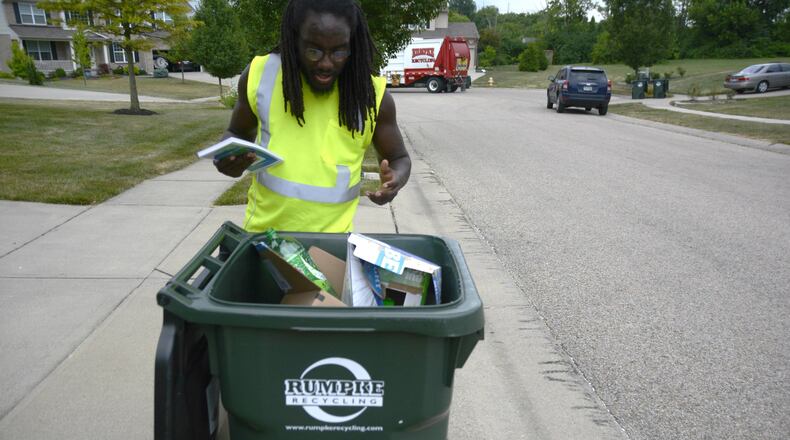In both communities, most of the recycling customers were placing items inside plastic grocery or store bags, which are considered a contaminant, she said. That’s not necessary.
“Put them loose,” she said of recyclable materials.
FAIRFIELD NEWS: How Fairfield has helped improve the world’s water quality for 25 years
Rumpke sees between 13 and 18 percent of inappropriate, or “contaminated,” material, in its recycling pickups, but the goal 5 percent, Broadwater said. End users that purchase bundled recyclable materials are cutting down on what they’ll accept as there is more supply than demand, she said.
Rumpke conducted an audit of Fairfield and Centerville recycling bins and carts in May to understand how much inappropriate, or “contaminated,” material, ends up in recycling facilities. The sampling of Fairfield customers found 23 percent of the material was “contaminated,” and it was 28 percent for Centerville’s customers.
In addition to plastic bags, Fairfield residents also left a significant amount of clothing, Broadwater said. More than 100 carts were issued a warning after the first day of the curb-side inspection.
In Centerville, they did not offer a warning as initially intended, said Broadwater.
“Sixteen percent of the carts were left behind, which was 55 carts,” she said.
Because there wasn’t a warning, Centerville’s inspections will last four weeks.
Residents already received a mailer about the curbside audit ahead of the start, and will soon receive a second piece of mail about not recycling plastic bags, or bagging recyclables.
FAIRFIELD NEWS: Fairfield considers lifting 13-year-old pit bull ban
“I’m not exactly sure what to expect,” she said after the first couple days of the curbside inspection.
“Based on the audit, there definitely was a need for a curbside checkup, and do some curbside education to help some residents,” Broadwater said. “We really do want to make sure their recycling efforts count. We want to make sure everyone’s recycling efforts count.”
Following the Fairfield and Centerville curbside audit, recycling customers in the city limits of Cincinnati will have a 10-week inspection as recycling is collected every other week.
———
WHAT CAN I RECYCLE?
Here are things Rumpke will take in recycling bins and carts:
• Paper products, like cereal boxes, cardboard and phone books
• Plastic bottles, including emptied drink, shampoo and detergent bottles
• Metal cans, but only non-hazardous and non-flammable materials, like soda cans or canned soups, fruits and vegetables
• Cartons, like emptied juice boxes, orange juice and milk cartons.
Here are things you cannot recycle with Rumpke:
• Plastic bags (return them to retailers)
• Yard waste and debris
• Any hazardous materials
• Clothing
• Cords, hoses or chains, or anything that tangles
• Batteries (Click here to find local retailers that takes batteries)
• Pots and pans
• Needles (Rumpke asks people place sharp objects, like needles, in a plastic container, seal lid with tape and write “sharps” on the container. Then dispose of the container in the regular trash)
Source: Rumpke
WHAT CAN I RECYCLE?
Here are things Rumpke will take in recycling bins and carts:
• Paper products, like cereal boxes, cardboard and phone books
• Plastic bottles, including emptied drink, shampoo and detergent bottles
• Metal cans, but only non-hazardous and non-flammable materials, like soda cans or canned soups, fruits and vegetables
• Cartons, like emptied juice boxes, orange juice and milk cartons.
Here are things you cannot recycle with Rumpke:
• Plastic bags (grocery stores do take used plastic shopping bags)
• Yard waste and debris
• Any hazardous materials
• Clothing
• Cords, hoses or chains, or anything that tangles
• Batteries (Click here to find local retailers that takes batteries)
• Pots and pans
• Needles (Rumpke asks people place sharp objects, like needles, in a plastic container, seal lid with tape and write “sharps” on the container. Then dispose of the container in the regular trash)
Source: Rumpke
About the Author

